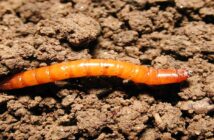A new insecticide treatment for module & block-raised brassica and salad crops will now give plants up to eight weeks protection against a wide range of aphid pests after planting. Cruiser 70WS is a new liquid formulation of the highly effective Syngenta insecticide, Thiamethoxam, approved exclusively for treatment utilising innovative Phyto-Drip technology.
Key benefits of Cruiser 70WS:
• Up to eight weeks highly effective protection from aphids.
• Fast seed germination and strong early growth.
• Innovative new precision application technique.
• No known insect resistance to Thiamethoxam.
• Important new tool for growers’ Integrated Pest Management programmes.
Used in brassica crops, including cabbage, Brussels sprout, cauliflower, broccoli, Chinese cabbage and kale, Cruiser 70WS controls aphid species Myzus persicae and Cabbage aphid (Brevicoryne brassicae).
Furthermore, in salad lettuce and endive crops, Cruiser 70WS prevents damage from a range of approved aphid species and reduces risk of the pest in harvested leaves and heads.
Welcoming the approval for Cruiser 70WS, Syngenta insecticide Technical Manager, Pete Saunders, highlighted that when adopted as part of growers IPM programmes it would significantly help to protect crops from leaf damage, reduce risk of virus infection and to market produce free from aphids.
The withdrawal of dummy pill treatments had left brassica growers with little or no option for effective early season insect pest control.
“Crucially for aphid control, Cruiser 70WS can help to prevent build-up of aphid populations resistant to other insecticide treatments, which will reduce pressure on other crops and achieve better results with foliar programmes,” he advised.
“This year, we have experienced the serious consequence of the loss of neonicotinoid seed treatment in oilseed rape – with the knock on effect of Myzus Persicae numbers at record levels in the spring affecting the vegetable sector.
“The approval of Cruiser 70WS for brassicas and salads could help reduce this increasing pressure of Myzus Persicae into crops.” Pete reported salad crop trials had shown a 95% overall control of the most problematic Myzus persicae aphids seven weeks after planting.
With application of Cruiser 70WS using Phyto-Drip technology plant raisers had seen excellent crop safety, with more uniform germination, faster growth and stronger rooting of lettuce plants, compared to conventional seed treatment, dummy pills or untreated seed.
“More uniform germination optimises plant raisers’ glasshouse performance and output, along with efficiency of planting out operations for growers,” said Pete. “Consistent, reliable fast crop growth protected by Cruiser 70WS aids better crop scheduling and field production.”
Phyto-Drip technology is an exciting development for the precision treatment of growing medium blocks at the time of seed sowing. The fully automated system, developed by Syngenta and engineers in Holland, delivers an extremely accurate dose in a single droplet of treatment onto a pre-seeded cell block.
The Cruiser 70WS is rapidly absorbed through roots and translocated evenly throughout the plant. As the seedling grows, more active is taken up by the larger root mass and continues to redistribute to maintain protection of the expanding leaf area.
Phyto-Drip technology is applied in the glasshouse in a fully controlled situation, with no risk for operators handling treated seed and no risk of environmental exposure in the field.
Pete Saunders advocated that for fast growing salad crops and in low pest pressure situations, Cruiser 70WS could provide complete control of aphids through to harvest. Longer growing season crops and high risk situations may require additional foliar treatments, including programmes utilising Plenum and Hallmark Zeon, depending on aphid species, he added.
“In practical cabbage brassica trials, Cruiser 70WS treated plants retained sufficient active for over 90% control of Myzus persicae aphids six weeks after application. Growers are advised to monitor aphid populations after planting out, and commence foliar treatments as soon as required.
“Cruiser 70WS should always used as part of an IPM approach and following the detailed label recommendations and advice.”
He added that Syngenta is working closely with the UK’s plant raisers and growers to bring the new technology to market. “Growers should be talking to their young plant suppliers at the earliest opportunity, to plan in requirements for next season,” he advised.



